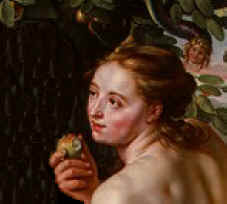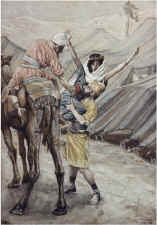
This Lesson includes Women Nine and Ten
Table of Contents Return to course main page Return to library
WOMAN NINE

Dinah
The Defiled Woman
I. Dinah the daughter of Jacob. (Gen 30:21; 34:1)
II. She was kidnapped and raped by Hamor the Hivite.
A. The kidnapping and rape. (:1-2, 26)
Dinah was in the wrong place at the wrong time. (:1-2)
B. Some things cannot be made right.
1. Human love and tenderness cannot undo sin. (:3)
2. Trying to make it right cannot undo your sin. (:4)
3. Others cannot hide your sin. (:5-7)
4. Your family cannot make it right for you- with any price. (:8-12)
C. Your sin affects everyone around you. (:13-31)
1. It affects the whole family and the neighbors of those who sinned. (:13-29)
2. It affects the whole family of those that were sinned against. (:30)
3. Sin must be dealt with. (:31)
We will see in the next segment, however, that cruelty and exacting self-vengeance are NOT the right ways.
| III. Vengeance is disapproved of by God. (49:5-7) | |
| The proper way for Simeon and Levi to have handled the situation would have been to rescue their sister, and then go to the authorities. Even if they hadn’t gotten justice from the authorities, then the extent of their judgment should have rested, at the most, upon the perpetrator and possibly his family for harboring him and keeping his victim captive. But it should have not gone any further than that. | |
IV. Summary.
From the life of Dinah we learn that victims need to take care to not become victims. Second, we find that their plight is not theirs alone but affects their entire family, their society, and the families of those who perpetrate crimes against them; i.e., victimization of any member of society, here- specifically women, kills some part of the society in which it happens and society must accept their part in perpetrating it by not doing enough to prevent it.
As a side note, we find that in the case of the society here in Genesis ch. 34, that greed was at the root of their problems. Their greed was used to manipulate them into a destructive course of action. (Gen 34:23-24)
From the life and plight of Dinah we also can see that sometimes an innocent victim can be forgotten about. They can become simply a focal point for perpetrating greater evil upon others; meanwhile the victims themselves are forgotten.
Finally, we can see that, contrary to the morals of society today, loss of virginity outside of marriage is a defilement and so too with the issue of not maintaining separation. (34:31; 14)
WOMAN TEN
The Wives & Other Women of the Line & Times of Esau
The Women of the Rejected Line
Brief mention will also be made of women of this same time that were not directly involved with Esau.
I. List of the wives of Esau and the other Women of that time. (Gen 36:1-3)
A. Wives.
Adah, Aholibamah, and Bashemath.
B. Other women of that time.
1. Timna the concubine of Eliphaz, Esau’s son, was the daughter of Seir the Horite. (:12)
2. Mehetabel, wife of King Hadar of Edom, and her mother Matred (who’s father was Mezahab.) (:39)
II. The Women.
A. Adah was the daughter of Elon the Hittite.
1. She bore Eliphaz to Esau. (Gen 36:4a)
2. Adah means “ornament.”
B. Aholibamah was the daughter of Anah and the granddaughter of Zibeon the Hivite.
1. She bore Jeush, Jaalam, and Korah to Esau. (:5)
2. Aholibamah means “tent of the high place.”
C. Bashemath was the daughter of Ishmael and sister of Nebajoth. (:3)
1. She bare Reuel to Esau. (:4b)
2. Bashemath means “spice.”
D. Timna was the concubine of Eliphaz, Esau’s son. (:12)
1. She was the daughter of Seir the Horite and sister to Lotan.
2. She bore Esau’s grandson, Amalek, by his son Eliphaz.
3. Timna means “restrained.”
F. Mehetabel was the wife of King Hadar of Edom and lived in Pau. (:39)
1. She was the ancestor of Shemaiah, the false prophet who was hired against Nehemiah by Tobiah
and Sanballat.
2. Mehetabel means “favoured of God.”
G. Matred was Mehetabel’s mother and the daughter of Mezahab. (:39)
Matred means “pushing forward.”
III. Summary.
The information on these women themselves is very sparse, so we must look at the families to garner a useful lesson. The lesson learned is that the rejected family lines and the peoples they intermarried with became the enemies of God’s people. From Esau we have the Edomites and the Hittites whom he intermarried with, both of which God’s people were forbidden to marry, and which helped turn Solomon, king of Israel, unto false gods. (I Ki ch. 11) Then also the Edomites refused to help Moses and the people in their flight from Egypt and made war with Israel on various occasions. (Num 20:14-21; et al)
Also from Esau’s daughter-in-law, Timna, came Amalek. Later, Agag, king of the Amalekites, was the ancestor of Haman; and Haman was the main persecutor of the Israelites in the time of Esther. If he had not been foiled by Esther, the hand of God for the protection of His people, then Haman would have totally destroyed Israel from the face of the earth forever.
The lessons then are two:
1. The first is that intermarriage with heathen women is forbidden by God. To disobey God and marry the heathen will lead to nothing but persecution and is to flirt with destruction. The application for today, of course, is that the Saved should never marry the Lost.
2. The second is that for a heathen woman to intermarry with someone who is out of the will of God will rob her of any chance to fit into the will of God and will lead to a curse that will be propagated upon her children, far into future generations; and will involve her in mothering the enemies of God and His people. The application for today, of course, is that for the lost to marry someone out of the will of God, even if that person they marry is saved, it will probably lead to children that will not be raised in the nurture and admonition of the Lord. Thus, their children will probably not get saved; and, the Scriptures tell us that the lost are under the curse of Hell and the Lake of Fire and, in addition, that they are "at enmity" with God.
LESSONS NINE & TEN TEST
This test is "open
book," which means you may
use your study materials while taking this test.
If you fail this test then you must wait a minimum of one day before you can
retake it. During that time you are required to go to the textbook and the
Bible, whichever is appropriate, and find the correct answers to every
question missed on the failed test. You may use the copy of the
failed test that was sent to you and refer to it for the correct
answers, which are included on it, to verify that you have
found the correct answers in your study materials.
Once you have found all of the correct answers
and waited the required one day, then you
may retake the test.
You cannot proceed to the next Lesson until the day after you have
passed this Lesson Test and found all of the correct answers
in the textbook or the Bible, whichever is appropriate, to
all questions missed on this test even though
you received a passing score.